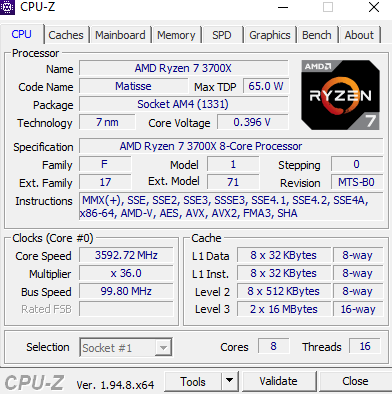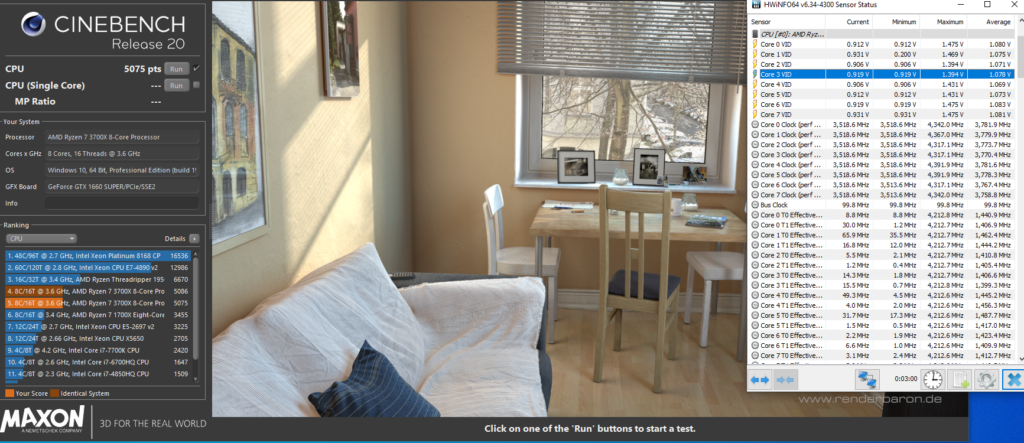Overclocking
Default
As we check on the overclocking capabilities of this motherboard, lets see what our default clocks look like.
Again we see, the default clock on the Ryzen 7 3700X is 3600MHz. A lot of the Ryzen 3xxx chips run at this base clock.
Now let’s see what we can get this chip up to on this motherboard.
Overclock
First lets take a look at the Cinebench R20 stats at the stock 3.6 GH/z
As we can see from the above Cinebench R20 picture, at the stock clock of 3.6 GHz we were able to score 5,075. It boosted up to 4.3 GHz on most of the cores, two of them just boosted to 4.1 GHz on all-core. Not too bad for being at the stock clock.
Next, we decided to manually overclock this chip and voltage. We figured we would start by trying an achievable 4.3 GHz.
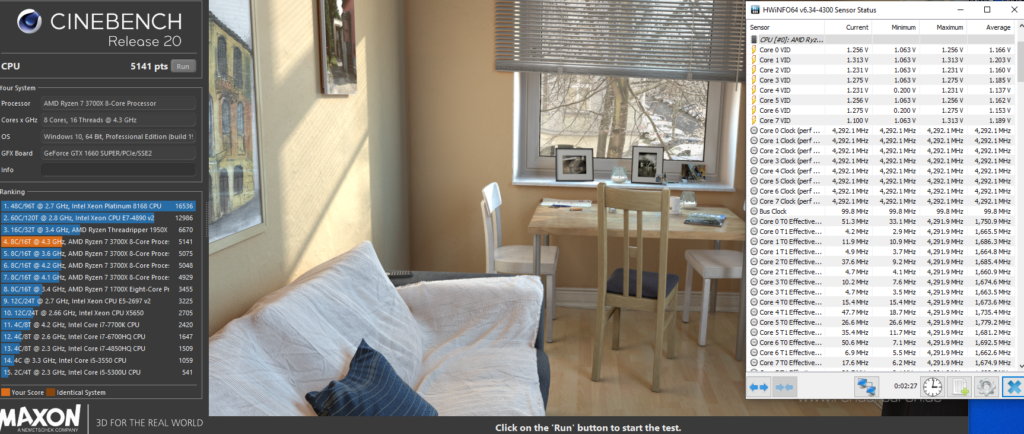
Well, we got a nice jump up to a Cinebench R20 score of 5,141 with the bump up to 4.3GHz overclock. The chip ran stable and never jumped above 60c during the test. We did have to bump the voltage on the core up to 1.275 to achieve this overclock.
Well, lets continue on and see if we can get to the magic 4.4GHz!
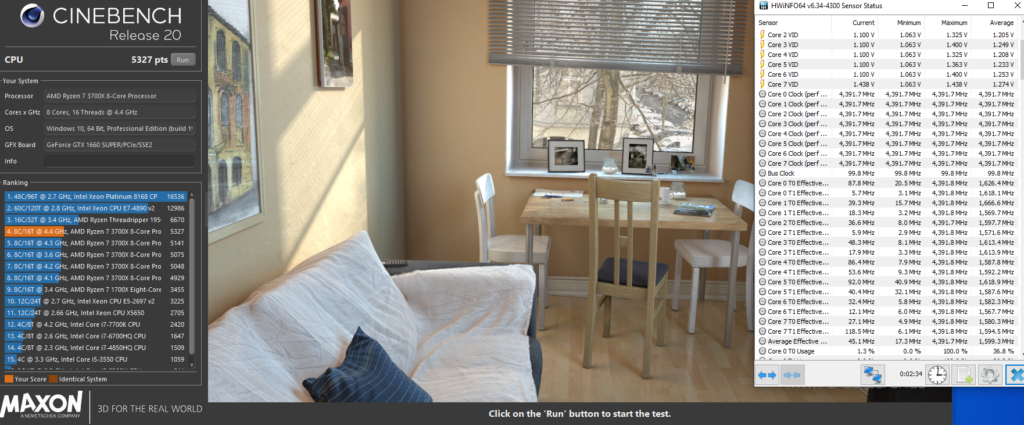
Oh yeah, we did hit the 4.4GH/z mark!!! We had to adjust our voltage up to 1.392 volts to achieve this goal. We had a spike, as you can see in the above picture, of 1.438 volts on the core 8 of the chip.
Should we go a bit further? Of course you want to see if we can get a bit more out of this chip.
Lets see if we can get 4.450MH/z!
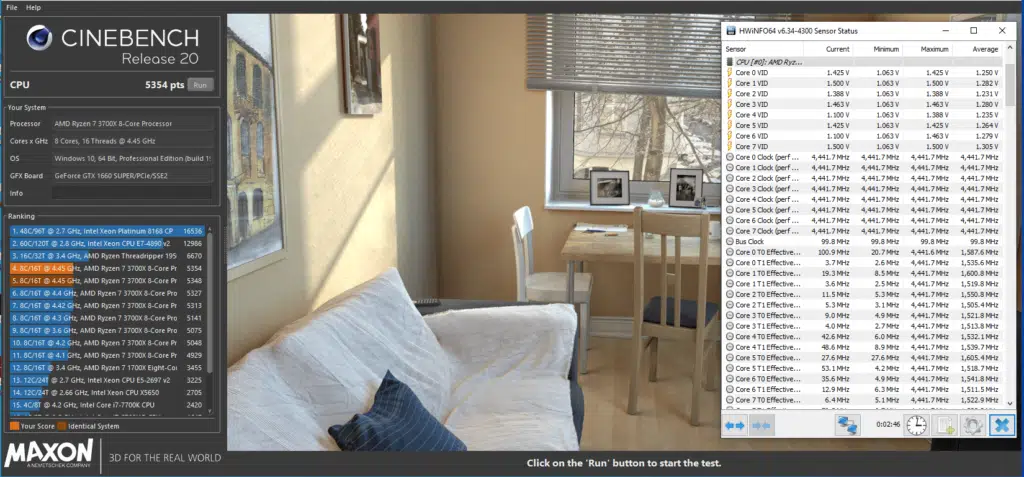
Yeppers, we hit 4.450 with an actual speed of 4,441.7 MH/z. We have seen a nice jump in the Cinebench R20 score! We actually ran this test twice at this speed. First, we ran it with a core voltage of our above 4.4 settings of 1.392 and we saw an impressive score of 5,348. We then upped the voltage to 1.425 and ran the test again. This time we saw a Cinebench R20 score of 5,354! Pretty impressive score for this system.
We attempted to try 5.0 GH/z and could not manage to achieve it even with more voltage boot to 1.45 volts. We then dropped it down to 4.475 and again, it wouldn’t run Cinebench R20 at this level even at the 1.45 volts.
So the bottom line is, we found that the stable “sweet spot” was 4,441.7 MH/z or 4.450 GH/z. and it seemed to run very stably at this speed. We really hoped for a better overclock on this chip and it could be the board vs the chip.
GIGABYTE includes a windows software they are calling “Easytune” which when we installed and attempted to overclock, the best we could achieve was 3.8 GHz. With that being said, we certainly attained a much better overclock the old fashion way; through the BIOS!
What we actually found odd was that at the stock 3.6GHz setting it had a core voltage of 0.396 Volts and at our achieved 4.450 GH/z we had set it at 1.45 volts. That’s quite a difference in core voltage. The Ryzen 7 3700X might have been able to achieve a better overclock with a higher voltage but we didn’t want to press the voltage any higher.
Keeping VRMs Cool
Keeping VRMs cool in any enthusiast’s motherboard is an important aspect of how well an overclock will hold up and how well the system will run. GIGABYTE’s B550 AORUS ELITE has large heatsinks installed to ensure the health of the VRMs. This added cooling on the motherboard should allow for many hours of gaming and any other possible tasks that one may need an enthusiast-level motherboard for.

As we see from the above-overclocked setting, the minimum never dropped lower than our 4.450GHz setting. Running Cinebench is a very demanding benchmark on the CPU thus this indicates that our VRMs are staying cool and not chocking the CPU so you don’t have to worry about the CPU throttling down during gameplay or any application that is CPU demanding.
We tested this motherboard in an open bench with no real airflow across the VRMs and an ambient temperature of 21 Celsius. Given this information, we feel GIGABYTE did an excellent job of protecting and keeping the VRMs cool for a worry-free computing experience.

